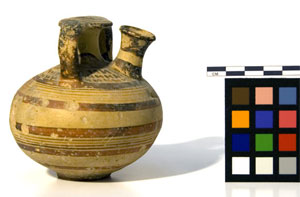

| Vol. XXIV, No. 3 | January, 2012 |
Articles in Vol. XXIV, No. 3
Website Review: Ara Pacis Augustae
In-depth visual documentation.
-- Martin Beckmann
Websites as Stable Resources
Too many have disappeared.
-- Harrison Eiteljorg, II
§ Readers' comments (as of 2/8/2010)
Website Review: Dikili Tash
A good beginning, but only a beginning.
-- Andrea Vianello
Evolving Web Standards: a Blessing and a Curse
Why eliminate good, useful tags?
-- Harrison Eiteljorg, II
§ Readers' comments (as of 2/3/2010)
Project Publication on the Web - Addendum
Making it clear that a final report is just that.
-- Harrison Eiteljorg, II
To comment on an article, please email
the editor using editor as the user-
name, csanet.org as the domain-name,
and the standard user@domain format.
Index of Web site and CD reviews from the Newsletter.
Limited subject index for Newsletter articles.
Direct links for articles concerning:
- the ADAP and digital archiving
- CAD modeling in archaeology and architectural history
- GIS in archaeology and architectural history
- the CSA archives
- electronic publishing
- use and design of databases
- the "CSA CAD Layer Naming Convention"
- Pompeii
- pottery profiles and capacity calculations
- The CSA Propylaea Project
- CSA/ADAP projects
- electronic media in the humanities
- Linux on the desktop
Search all newsletter articles.
(Using Google® advanced search
page with CSA Newsletter limit
already set.)
Reader Commentaries on and Responses to
Websites as Stable Resources
by Harrison Eiteljorg, II
This comment was made by Susan Ferrence, Director of Publications at the Institute for Aegean Prehistory Academic Press, and posted on February 3, 2012.
I greatly appreciate the recent review of the CSA web site reviews. It certainly supports INSTAP Academic Press' long-standing policy of avoiding the citation of a web site in a print publication. When a printed URL goes out of use at some point after the book in which it is cited is published, then the citation becomes useless. If web sites demonstrate stability in the future, then we will seriously consider changing our policy.
A response from Harrison Eiteljorg, II, posted February 8, 2012.
I regret that my concerns about longevity, stability, and reliability of websites has been taken to mean that websites should not be cited. While I can understand that sentiment, I believe that, whether we like it or not, many resources will be available to scholars only on the web. There is, after all, no other way to present large numbers of color images, GIS data sets, full databases, or CAD models, not to mention more obscure data types such as video recordings. (The CSA Propylaea Project naturally comes to mind.) If a specific piece of information is only available via a website but citation of a website is not permitted, what is the end result? It seems to me that the end result might well be an author prevented from saying what he knows and can demonstrate because there is no way to cite the evidence. I would greatly prefer that a citation be permitted and that it be full and complete, perhaps even expressing reservations about the longevity of a specific document that a scholar finds critical for a thorough discussion.
My intent was to point out the need for better, more thoughtful, and more responsible management of websites, not to encourage people to marginalize them. The future, I think, promises more and more material available on websites only. There are simply too many kinds of resources that can only be made available via the web. Our job is not to run from that future but to try to make it meet our real and important needs.

Commentaries for the CSA Newsletter are assembled by the staff in cooperation with contributors. All are published with an assumption that there will be additions from time to time and are maintained, with the latest additions, at the CSA website. While additions are normal, changes other than corrections of typos or similar errors will rarely be made after publication. If any such change is made, it will be made so as to permit both the original text and the change to be determined.
Comments like those here are welcome, and comments, questions, concerns, and author responses will be published in these separate commentary pages regularly.